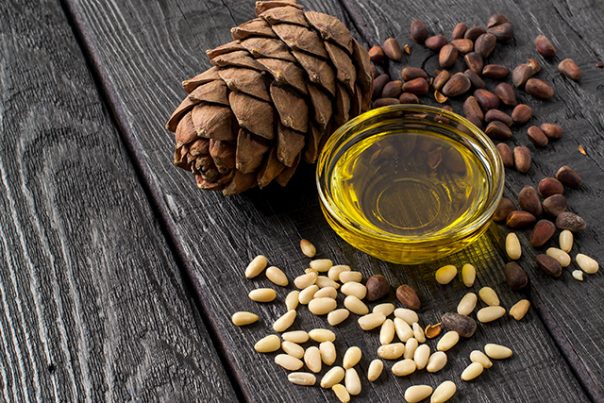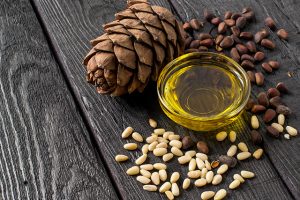
Pine seed oil – sources, health benefits, nutrients, uses and constituents at NaturalPedia.com
Thursday, November 02, 2017 by Michelle Simmons
http://www.naturalpedia.com/pine-seed-oil-sources-health-risks.html

Pine seed oil is a type of a pressed vegetable oil that is extracted from the edible seeds of different species of pines, such as the European variety known as Pignoli and the American variety known as pifiions. The oil’s quality depends on the type of pine nut it was extracted from. The pine seed oil that has the best quality is the Siberian pine nut oil. Pine seed oil is also commonly known as pine nut oil or cedar nut oil. It has high curative properties and has a very low smoking point. It was first used for cooking in Russia and was used for trading in France.

List of known nutrients
Pine seed oil contains a lot of nutrients, as listed by OnlyFoods.net. These include:
- Calcium
- Cobalt
- Copper
- Iodine
- Linoleic acid
- Magnesium
- Manganese
- Oleic acid
- Palmitic acid
- Phosphatidic phosphorus
- Phosphorus
- Pinolenic acid
- Polyunsaturated fatty acids
- Stearic acid
- Vitamin B1
- Vitamin B2
- Vitamin B3
- Vitamin E
- Vitamin F
- Zinc
Medicinal uses for pine seed oil
According to an entry by The Fusion Model, pine seed oil can be used for digestive tract disorders. A 2008 study published in the Journal of Food Chemistry found that its oil contains antioxidants that act as free radical scavengers, which help in reducing the oxidative damage to the cells in the digestive tract. The oil can also be used to treat and prevent bloating and inflammation. Pine seed oil is also beneficial for the digestive health as it can help in digestion and boost metabolism. Therefore, it can also help in losing weight. Pine nuts and its oil can also be used in lowering low-density lipoprotein or LDL levels in the body because of the pinolenic acid they contain. This was shown in a study of Korean pine seed oil in 2004. In a 2008 study published in the journal Lipids in Health and Disease, it showed that Korean pine nut oil could reduce food consumption by increasing the satiety hormones in both postmenopausal and overweight women, acting as an appetite suppressant.
However, there are a few side effects that pine seed oil can cause in the body. One of these is allergic reactions, especially if a person is allergic to peanuts or other tree nuts. Its symptoms include swelling, wheezing, stomach ache, itchy hives, and vomiting. Moreover, it can trigger anaphylaxis, which is a condition that causes the airways to swell and blood pressure to drop. Other side effects of pine seed oil include seizures and bleeding.
Body systems supported by pine seed oil
In an entry by the OrganicFacts.net, pine seed oil is beneficial for the integumentary system as it can treat different skin problems such as psoriasis, itching, pimples, eczema, poor skin, scabies, sores, and fleas. Pine seed oil also supports the ocular system. Because it neutralizes free radicals in the body that cause degradation of the body’s cells, it can improve the health of the eyes and protect them from age-related eye disorders such as macular degeneration and cataracts. Moreover, the oil is beneficial for the excretory system. Due to its antibacterial properties, it can be used as a natural remedy for urinary tract infections. Pine seed oil supports the respiratory system. It is helpful in treating respiratory problems such as cough and cold. As an expectorant, it loosens phlegm and mucus from the respiratory tract and makes it easier to get rid of them. Lastly, it is beneficial for the digestive system. Aside from aiding in metabolism, it is good in lessening the inflammation of the gall bladder and the risk of having gallstones.
Ways to use pine seed oil
Since pine seed oil is biologically active, it is used in body massages and cosmetic facials. It is also used in the kitchen, but not as a cooking oil. It is usually added as a flavoring to the food and as a preservative for bread. Pine seed oil is also used in household products such as room sprays, volatile liquids, and room fresheners. It is also used as a dietary supplement in the form of capsules.
Where to learn more
- Pine Nut Oil Extract Found to Reduce Appetite, Caloric Intake at Meals
- Korean Pine Nut Oil Boosts Appetite Suppressors Up To 60% For 4 Hours (press release)
- Herbs.news
- SuperFoodsNews.com
- Nutrients.news
Summary
Pine seed oil can treat digestive tract disorders and help in digestion and metabolism.
Pine seed oil can lower LDL cholesterol levels.
Pine seed oil is beneficial for the integumentary, ocular, excretory, respiratory, and digestive systems.
Sources include:
Tagged Under: Tags: pine seed oil





